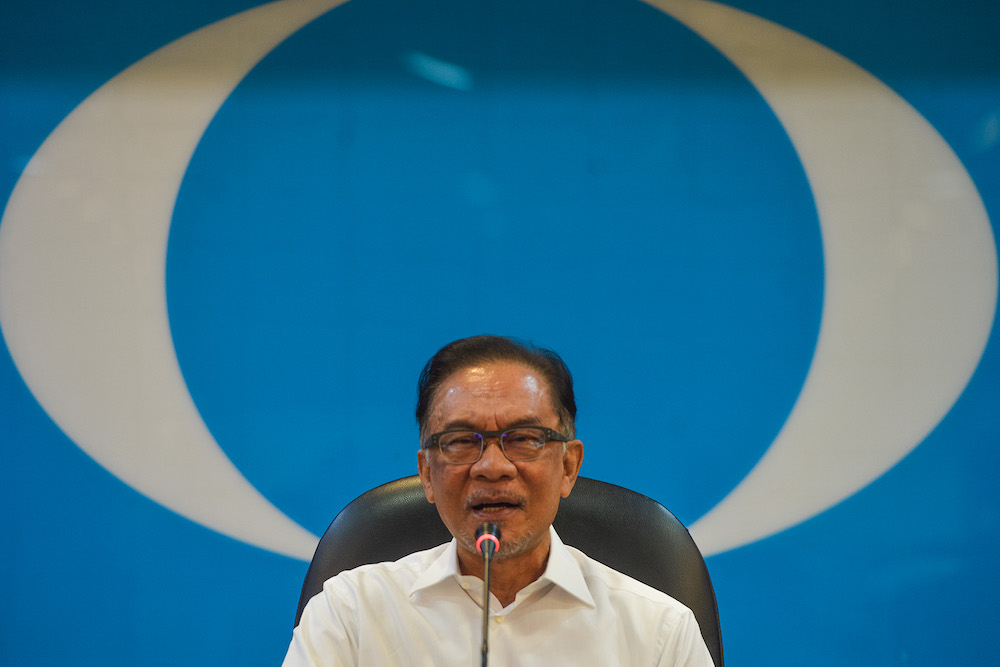Subscribe to our Telegram channel for the latest updates on news you need to know.
KUALA LUMPUR, March 31 — There is no need for the federal government to gazette a new law to enable the disbursement or paying out of public funds for additional spending beyond the government’s Budget without parliamentary oversight during the Emergency, PKR president Datuk Seri Anwar Ibrahim said today.
Anwar, who is also Opposition Leader, also said the Budget 2021 would have already set aside sufficient government funds for the Covid-19 pandemic.
“While PN states the emergency is necessary to battle Covid, in fact the laws which are being enacted under the emergency have little to do with Covid and mostly are about punishing civil society, suppressing free speech and pilfering the public coffers,” the Port Dickson MP said in a statement today, referring to the Perikatan Nasional administration and the Emergency ordinances gazetted by the government.
“There is absolutely no reason for the government to seek such extraordinary fiduciary powers at this time. The 2021 budget has been passed less than four months ago which allocated adequate spending for Covid-19 response,” he said.
In objecting against allowing additional government spending without Parliament’s scrutiny, Anwar went on to say that MPs in Parliament would have likely given their approval for any extra government expenditure if it was justified.
“Any valid additional spending would be approved in Parliament by a majority and would likely gain bi-partisan support if it was deemed appropriate.
“I strongly oppose this law. I believe it is unethical and irresponsible. I am concerned about the impact on the nation’s reputation and the further erosion of confidence in our economy,” he added.
He then concluded for Parliament to immediately resume to prevent Malaysia’s democracy from weakening further.
Malaysia has been put under a state of Emergency from January 11 until the expected end date of August 1 unless lifted earlier. During this period, Parliament and state legislative assemblies — which typically play the role of checks and balance on the executive branch of the government — have been suspended until further notice.
While the Yang di-Pertuan Agong has previously clarified on February 24 that Parliament can be convened during the Emergency on a date that the Yang di-Pertuan Agong thinks is appropriate on the advice of the prime minister, the Perikatan Nasional administration has not provided such advice that would enable Parliament sittings to resume.
The gazetted new law that Anwar referred to is the Emergency (Essential Powers) (Amendment) Ordinance 2021, which was gazetted today and takes effect from today.
This new Emergency ordinance amends an earlier January 14 Emergency ordinance on powers given to the federal government.
Among other things, the new Emergency ordinance will also temporarily suspend procedures under the Government Funding Act 1983 and the Treasury Bills (Local) Act 1946 on funds raised by the federal government via the finance minister under Shariah-compliant instruments or borrowings through the issuance of Treasury bills.
In other words, the usual procedure — where the Dewan Rakyat’s prior approval is needed before funds borrowed by the federal government can be channelled into the federal government’s Development Fund — would be suspended during the Emergency.
The new Emergency ordinance will also temporarily allow the Finance Ministry to approve withdrawals from the government’s Federal Consolidated Fund, as well as to approve additional spending of the federal government’s funds beyond the initial Budget without going through the usual route of seeking Parliament’s approval, during the Emergency.
Typically, Parliament’s approval is needed for the federal government’s Budget spending through a Supply Bill that has to be passed in Parliament, while estimates of supplementary expenditure has to be presented before the Dewan Rakyat for approval.
Supplementary expenditure refers to situations when the amount allocated in the approved federal government’s Budget via the Supply Act is insufficient or when the money spent is more than allocated in the Budget or when there is a new need for spending which had not been allocated previously in the Budget.



